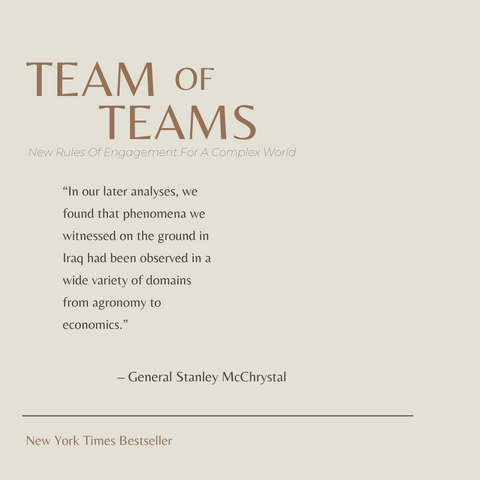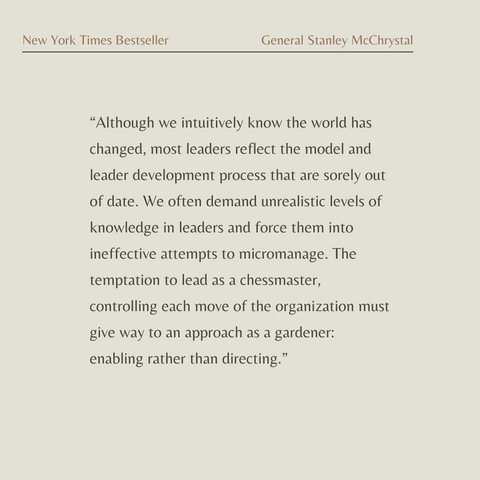Your Cart is Empty
Team of Teams Book Summary: How To Manage Without Micromanaging
Listen To This Article
How To Manage Without Micromanaging
Efficiency is no longer enough - businesses also need to cultivate the ability to adapt. Teams are the most effective way to approach changes in a complex world, and the key to an effective team is open communication. A successful manager cultivates like a gardener instead of micromanaging like a chessmaster.Learn The Ability To Adapt
- Failure can be used as a starting point to create an adaptable system that works.
- Open information flow is better for everyone - even in a “need to know” organizational structure.
- The ability to adapt is just as important as efficiency.
- Big data makes it easier to micromanage, but that still does not make it an effective management strategy.

Featured In This Review
Team of Teams
$14.90
A book about bringing a team together. Finding success through slow methodical actions that are well received. Opening up lines of communication. Building a business that is able to adapt and more.
SHOP NOWTeam of Teams Book Summary
Managers often view themselves as chessmasters, where each piece is static and forces working against an organization are polite enough to take turns. In addition, this perspective assumes that everyone follows the rules. This idea of management is incorrect, according to General Stanley McChrystal in Team of Teams, because the world is more complex than a chess board. Another book with a lovely chess analogy and story of how specialized expertise has become old news is Range.
In addition, businesses are built to be as efficient as possible. What if efficiency on its own is not enough?
In the early 2000’s, the United States military was struggling to capture terrorist leaders, despite having more manpower, better training, and superior technology. McChrystal headed the special task force responsible for capturing Abu Musab al-Zarqawi, one of Al Queda’s key operatives.

In diagnosing the problems the military was facing, McChrystal uncovered some fundamentals that every manager should understand. Efficiency is no longer king - organizations also need resilience and the ability to adapt. This is achieved through teamwork, because the world today is a complex system with too much information for one person to process. This topic is supported greatly in the book Creating Magic.
Finally, a good manager is closer to a gardener than a chessmaster. Team of Teams illustrates each of these ideas with easy to understand examples from agronomy, Fortune 500 companies, and military history.
Past generations of business were driven by efficiency only. Team of Teams briefly explains the beginning of the Efficiency Movement with Taylor and the Bethlehem Steel Corporation’s significant success. The ideology that efficiency is the most important goal has shaped how the military (and businesses) approach all problems.
This model works with standard, repeatable processes, but is not sufficient for the modern environment. McChrystal explains Efficiency is no longer enough for a business to be successful. This point is driven home well in the founder of Behance’s book The Messy Middle.
Want to buy a book review like this?
Click here to learn how to get your book reviewed!
Businesses operate now in a complex system. Management theory now concerns far more than how many widgets are being produced per hour. Team of Teams uses an example of the human body to illustrate a complex system. A hand surgeon usually only sees one part of the body - the hand. However, the hand surgeon still went to medical school to learn how the rest of the body works.
This is because medical conditions not centered in the hand can cause problems that the hand surgeon will have to fix. The human body is too complex for one person to understand all of it well, which leads to specialization and teams. You might read Small Giants for more on how to become a great company.

In complex systems, teams are more effective. How does one develop a successful team? McChrystal advises to let information flow freely, and to discourage tribal competition between departments working towards the same goal.
The dangers of “silos” in companies are illustrated with an example from General Motors and a key ignition recall. The departments were so separate and so competitive that no one was aware or wanted to advertise a key ignition issue which could cause airbags not to deploy. This led to deaths when airbags failed. Jocko Willink’s book Extreme Ownership would probably point to better leadership as a solution too.
In his own experience, McChrystal outlines putting together a daily meeting where individuals across all teams, not just his taskforce, got together to share information. McChrystal acknowledged that while this daily ninety minute meeting would be viewed as inefficient, it allowed information to flow freely. This, in turn, saved a great deal of time seeking authorization because problems were solved during the meeting.
Another major issue that can reduce an organization’s ability to adapt is the top-down, micro-managing approach to management. One of the most important aspects of having a resilient organization is to have a team who view problems holistically, and who understand the big picture.
Indeed, the top-down management schema of “you’re on a need to know basis” is shown to be outdated. Perhaps one of the biggest challenges McChrystal faced was that he, as a manager, was not a chessmaster, but a gardener. He began working toward cultivating his team instead of dictating their every move. This is something Disney does so well. You can find more about that in the book Creativity Inc.
Team of Teams argues that more information than ever is available to managers, which makes it very easy to micromanage. However, this is a dangerous pitfall that can have dire consequences. In 1978, United Flight 173, which experienced a small landing gear malfunction prior to landing. The team worked to diagnose the problem, determine the best way to proceed, and followed procedure.
At that time, a strict top-down management structure was in place. When an engineer asked repeatedly to check the fuel gauge and land, he was ignored. United Flight 173 ran out of fuel and crashed, resulting in ten deaths.
This example is used alongside Captain Sullenberger’s heroic landing on the Hudson river is an example of how important it is for a team to not rely on one chessmaster, but to each have a role in a rapidly evolving situation.

Captain Sullenberger only had one task - to land the plane safely. The rest of his team performed all other duties - like assuring and preparing passengers - without having to consult him for each direction. More information about airplane and other hierarchy issues just like this can be found in a book about success: Outliers.
Now more than ever, it has become apparent that the ability to adapt to a rapidly changing environment is an important tool for managers in every sector to have. General McChrystal faced a rapidly changing environment and successfully transformed his taskforce to take on those challenges by creating a team of teams.
What made that transformation possible was the sharing of data to anyone who might find it useful instead of keeping it locked down within departments.
He also worked to redefine the manager’s role from chessmaster to gardener. It is far more effective to give a team everything they need and help them succeed than to control their every action. With concise examples and applications in every sector, Team of Teams applies military strategy to the principles of business, and the result is a success. One of the other amazing reads on Leadership is called Leading. The book is written about what the head coach Manchester United learned from his many years of leadership.
About The Author Stanley McChrystal
General Stanley McChrystal began his military career in 1976 after graduating from West Point. His early assignments include command of a Green Beret unit, serving as a United Nations intelligence officer, and the 75th Ranger Regiment.
After earning a master’s degree in national security and strategic studies from the Naval War College, he was deployed to Saudi Arabia with the Joint Special Operations Command (JSOC) which works with units such as Delta Force and the Navy Seals. He also completed a fellowship at the John F. Kennedy School of Government at Harvard University.
Later, he would command this unit and initiate steady lines of communication between JSOC and the Central Intelligence Agency (CIA). In 2009, McChrystal assumed command of the NATO-United States missions in Afghanistan, during which he commanded more than 150,000 troops from 45 different countries. He retired in 2010 as a four-star general.
Now, General McChrystal now sits on the boards of Navistar International Corporation, Siemens Government Technology, and JetBlue Airways. As a senior fellow at Yale University, he teaches a course in Leadership. Shortly after retiring from the military, he co-founded the McChrystal Group which provides management consulting based on the principles in Team of Teams. He also travels around the United States to speak on management.
Want to buy a book review like this?
Click here to learn how to get your book reviewed!
Leave a comment
Comments will be approved before showing up.
Also in Books

The Best Books for Google Analytics 4 (GA4) Training
Unlock the secrets of Google Analytics 4 with our curated list of the best GA4 training books for 2023! Dive deep into actionable insights, master advanced techniques, and lead the digital analytics revolution. Don't get left behind; discover the ultimate resources to dominate GA4. Click now to elevate your skills!
Read More
10 Must-Read Books for Aspiring Entrepreneurs
Do you dream of starting your own business? If so, you need to read this article! We've compiled a list of 10 must-read books for aspiring entrepreneurs. These books will provide you with the knowledge and inspiration you need to turn your dream into a reality. Click here to read the article and learn more!
Read More
Top 15 Books on Personal Finance
Are you looking for a safe and informative place to learn about personal finance? If so, you've come to the right place! This article discusses the top 15 personal finance books on the market, all of which are sure to help you improve your financial situation without any explicit sexual descriptions or that is sexually suggestive in nature or is primarily intended to cause arousal.
Read More